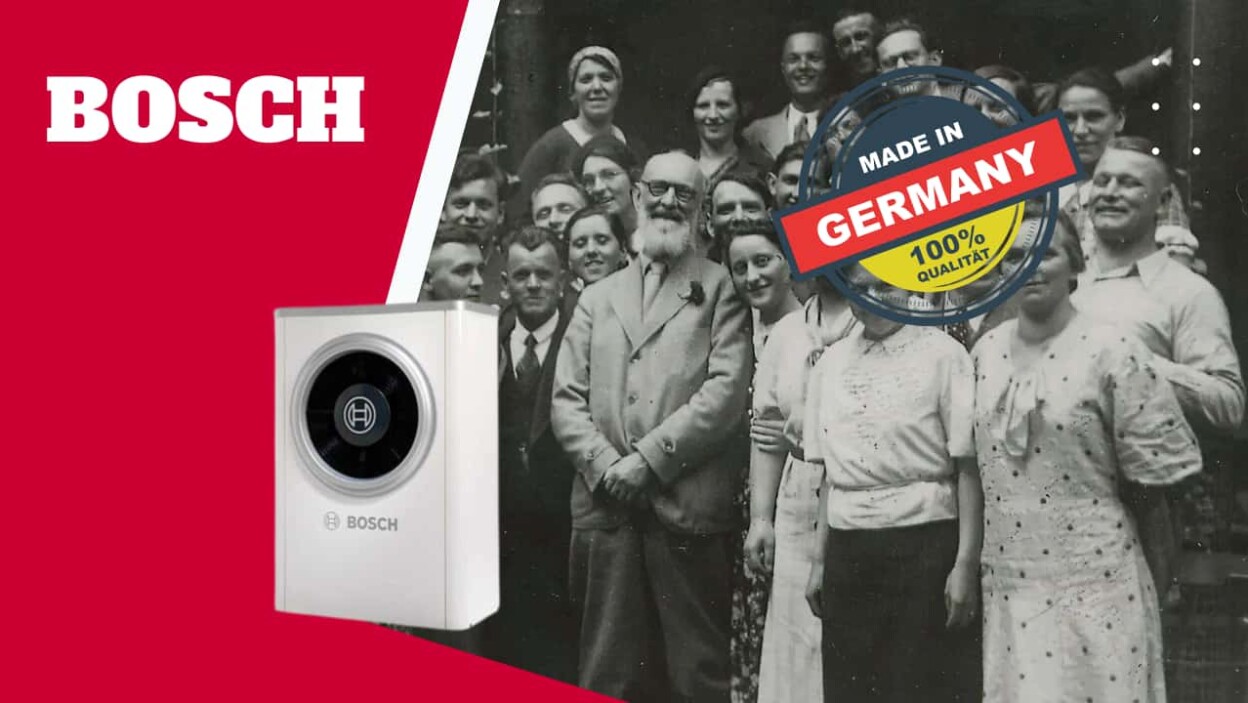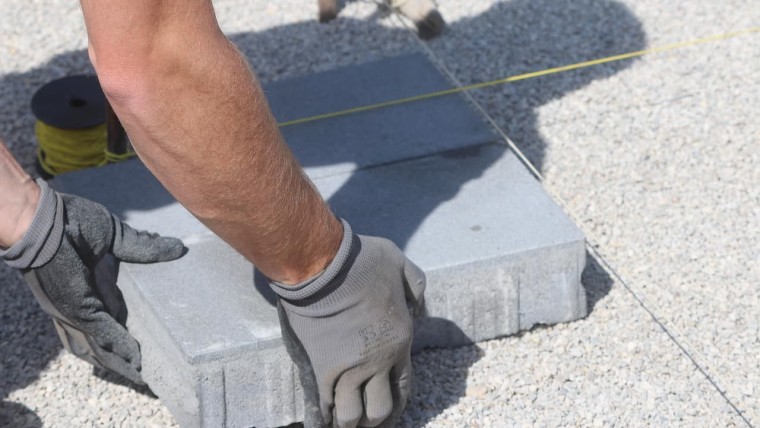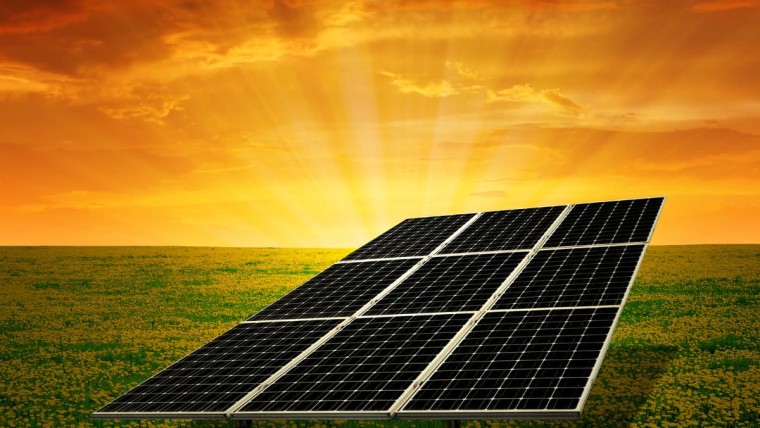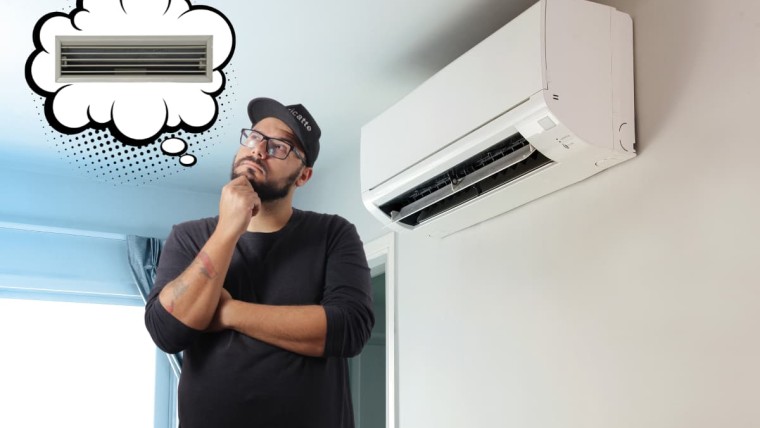Bosch is a member of the very select club of Deutsche Qualität, which includes companies known for the reliability, robustness and performance of their products. In this practical guide, we review Bosch's range of aerothermal and geothermal heat pumps: advantages, disadvantages, prices, reviews, financial aid, tips for choosing, alternatives, etc. Let's get started!
Bosch: from a mechanical workshop to a large, sprawling group
The history of this great group began in 1886, under the impetus of Robert Bosch. This German industrialist, who had worked for Thomas Edison in the United States, created the "Workshop for Precision Mechanics and Electrical Engineering" near Stuttgart.
Difficult beginnings... until the lightning of the ignition magneto
The first steps are laborious, since the workshop is limited to precision mechanical and electrical work, including the installation of telephone systems and electric bells for individuals.
In the 1890s, Robert Bosch received a rather unusual request to manufacture an ignition magneto for a stationary engine based on an existing model. He took the opportunity to improve the product and thus launched the production of ignition magnetos, a division that would be the real start of the Bosch Group.
Bosch, from 1898 to today
- In 1898, Bosch opened its first sales office outside Germany, in London. Other agencies soon followed throughout Europe, starting with France in 1899;
- In 1901, Bosch built its first factory. In 1905, the factory became a large production site;
- In 1903, the Belgian Camille Jenatzy won the Gordon Bennett Cup at the wheel of a Mercedes with a Bosch ignition system... a great advertisement for the brand!
- The First World War put a stop to Bosch's spectacular evolution;
- In 1918, Bosch resumed its activities and concentrated on road safety. The company launched lighting systems for motorcycles and bicycles, horns, windshield wipers and battery-powered ignition systems;
- At the end of 1936, Bosch launched the diesel injection pump, then the gasoline injection for engines;
- In 1942, Robert Bosch died. A few years later, the Allies destroyed Bosch's installations: everything had to be redone;
- In the early 1950s, Bosch rebuilt itself in the consumer market with household appliances, DIY tools and, above all, car radios;
- The electronics division was launched in the 1970s, notably with transistors and integrated circuits;
- The period from 1960 to 1980 was marked by the transformation of Bosch into an international group, with self-managed divisions. The group became the leader in automotive electronics (semi-conductors, on-board computers) and entered the telecom business;
- The 1990s, 2000s and 2010s were characterized by solid establishments in Asia (China, India and Japan). The Telecommunications Division was sold in the early 2000s and replaced by the Thermotechnology Division with the acquisition of Buderus in 2003.
- In the wake of this, Bosch is moving into small, lightweight lithium-ion battery tools, electric bicycles, autonomous driving and smart cooling.
Presentation of the Bosch heat pump
In 2008, Bosch became interested in renewable energies, with the launch of several innovative energy systems such as heat pumps and solar collectors. Bosch designs and produces both air-to-water and air-to-air heat pumps and geothermal heat pumps, with three ranges per heat pump family. These ranges will be described in detail later in this guide. For now, let's look at the advantages and disadvantages of Bosch heat pumps.
Benefits of Bosch heat pumps
- The experience of a brand more than a century old (1886);
- Bosch heat pumps are developed in Europe, in the German brand's own factories;
- Bosch's DHW tanks are manufactured in France, in its factory in Brittany;
- Efficiency classes up to A++ ;
- An average COP of 4, with peaks of 5.01 if you live in a region where the annual temperature stays around 7° C ;
- We remain on relatively quiet PACs. Even the most powerful models remain under 55 db (A);
- Possibility to integrate a Double Swap to accept heat from solar thermal panels;
- Bosch offers an online sizing tool for heat pumps adapted to your home (see here) ;
- The expanded polypropylene outer shell drastically reduces the weight of the outdoor unit while limiting noise;
- Design is a strong point of the latest Bosch heat pumps. Some outdoor units have a futuristic look. No visual nuisance on the horizon!
- Very intuitive, the integrated control application allows you to control the Bosch heat pump remotely;
Disadvantages of Bosch heat pumps
- The flattering design of the outdoor units unfortunately has an impact on the space requirement, which is larger than the market average. Integration under the window is difficult, if not impossible;
- The indoor units are more classic (boiler or refrigerator style);
- The majority of air-to-water heat pumps use R410a refrigerant, which is more polluting and less efficient than R410b. R32 (with the exception of Compress 3400AW).
Bosch air-source heat pumps
As you know, air source heat pumps draw heat from the air to provide heat in winter and cool air in summer. Unlike the ground temperature, which remains relatively stable, the air temperature is very volatile. This is why air-source heat pumps have a little more difficulty performing outside of temperate zones.
Bosch offers 4 ranges of aerothermal heat pumps: the Compress 7400 AW, the latest Bosch aerothermal heat pump, the Compress 7000 AW, the Compress 3400 AW and the Compress 3000 AW. Let's take a closer look.
#1 Bosch Compress 7400 AW air-to-water heat pump
This is the latest heat pump model from Bosch. The range consists of an outdoor unit (hydraulic connection) and three models of indoor units: the wall-mounted unit with electric backup (up to 9 kW) with optional DHW, the DHW column (cooling and hot water production, 190 L stainless steel tank) or the wall-mounted unit for boiler backup with DHW. In all three cases, the Compress 7400 AW air-to-water heat pump can be connected to radiators or underfloor heating.
This heat pump has a COP of up to 5.01, with a seasonal efficiency (EtaS) of 198 %. For heating, we are on an energy class "A++" at 35 ° C and "A++" at 55 ° C. The DHW part is less environmentally friendly, with an energy class of "A".
The front diffuser reduces noise (34 db A in Day mode), hides the fan operation and avoids its blowing. Among the disadvantages, we can deplore the use of R410a refrigerant, which has a global warming potential three times lower than R32. It is also more polluting.
| CS7400iAX 5 OR-S (7kW) | CS7400iAW OR-S (8kW) | |
| Energy efficiency class - heating 35°/55 | A++/A++ | A++/A++ |
| COP +7°/+55 | 2.57 | 2.84 |
| COP +7°/+35 | 5.01 | 5.01 |
| COP -7°/+35 | 3.02 | 3.08 |
| SCOP 35°/55 | 4.99/3.41 | 5.02/3.58 |
| External operating temperature range (heating) | -20/+35 | -20/+35 |
| Sound pressure (day/night mode) in dB (A) | 34/27 | 36/29 |
| Type of refrigerant | R410a | R410a |
#2 Bosch Compress 7000 AW air-to-water heat pump
This is the brand's flagship model. From the outset, it is the futuristic design of the exterior package that catches the eye. A salutary effort in a market where appearance is often austere. As explained in the drawbacks of the brand's heat pumps, Bosch seems to have sacrificed the compactness of the outdoor unit in the name of flattering design. It will be difficult to fit this heat pump under a window... but that's where the drawbacks end.
We are on a good COP, around 5 for A7/W35, in temperate zones. In other words, you will pay up to 5 times less electricity for the same amount of hot energy produced compared to conventional electric heating.
Acoustically, the small powers are really very quiet (around 48 dBA). We stay globally under 55 dBA for the big powers. This good performance can be explained in part by the use of an expanded polypropylene (EPP) coating. Also noteworthy:
- This heat pump is equipped with Bosch's "Compact" technology: hydraulic connection between the indoor and outdoor modules, without handling the refrigerant;
- Electrical accessories can be automatically detected by the control system and integrated into the indoor module in Plug & Play mode;
The air-water heat pump Compress 7000 AW is available in 5 power variants:
- CS7001iAW 5 OR-S : 7kW A7/W35 Single Phase
- CS7001iAW 7 OR-S : 8kW A7/W35 Single Phase
- CS7001iAW 9 OR-S : 11kW A7/W35 Single phase
- CS7001iAW 13 OR-S : 17kW A7/W35 Single Phase
- CS7001iAW 13 OR-T : 17kW A7/W35 Three-phase
- CS7001iAW 17 OR-T : 20kW A7/W35 Three-phase
Here is a summary table of the main technical characteristics of the Bosch 7000 AW air-to-water heat pump.
| CS7001iAW 5 OR-S 7kW | CS7001iAW 7 OR-S 8kW | CS7001iAW 9 OR-S 11kW | CS7001iAW 13 OR-S 17kW | CS7001iAW 13 OR-T 17kW | CS7001iAW 17 OR-T 20 kW | |
| Energy efficiency class - heating 35°/55 | A++/A++ | A++/A++ | A++/A++ | A++/A++ | A++/A++ | A++/A++ |
| Energy efficiency class (ErP) - DHW | A | A | A | A | A | A |
| COP +7°/+55 | NC | NC | NC | NC | NC | NC |
| COP +7°/+35 | 4.69 | 5.31 | 5.02 | 4.68 | 5 | 4.87 |
| COP -7°/+35 | 2.81 | 2.79 | 2.79 | 2.74 | 2.74 | 2.55 |
| SCOP 35°/55 | NC | NC | NC | NC | NC | NC |
| External operating temperature range (heating) | -20/+35 | -20/+35 | -20/+35 | -20/+35 | -20/+35 | -20/+35 |
| Sound pressure (day/night mode) in dB (A) | 39/33 | 41/36 | 42/36 | 42/35 | 42/35 | 42/36 |
| Type of refrigerant | R410a | R410a | R410a | R410a | R410a | R410a |
#3 Bosch Compress 3400 AW air-to-water heat pump
It is a recent model, designed for both new construction and renovation. We appreciate the great modularity of the powers, going from 4 to 14 kW, as well as the energy efficiency that allows the Inverter technology, with a SCOP up to 4,89 in A7/W35 and an energy efficiency class ErP A+++ (flow temperature of 35° C). Also worth noting:
- Combined with the Bosch energy manager, it easily allows the use of self-generated solar energy;
- The Bosch HomeCom Easy app makes it easy to adjust the room temperature from your smartphone or tablet;
- The wireless connectivity will allow your installer to check and adjust the settings of the heat pump by remote diagnosis, if necessary;
- Positive point: this heat pump uses the new generation refrigerant (R32).
The Bosch Compress 3400 AW air-to-water heat pump is available in 9 variations:
- CS3400iAWS 4 OR-S : 5 kW ;
- CS3400iAWS 6 OR-S : 6 kW (single phase) ;
- CS3400iAWS 8 OR-S: 8 kW (single phase) ;
- CS3400iAWS 10 OR-S : 10 kW (single phase) ;
- CS3400iAWS 12 OR-S : 12 kW (single phase) ;
- CS3400iAWS 14 OR-S : 14 kW (single phase) ;
- CS3400iAWS 10 OR-T: 10 kW (three-phase) ;
- CS3400iAWS 12 OR-T : 12 kW (three-phase) ;
- CS3400iAWS 14 OR-T: 14 kW (three-phase).
Now let's take a look at the summary table of technical data for the Bosch Compress 3400 AW air-to-water heat pump.
| CS3400iAWS 4 OR-S 5 kW | CS3400iAWS 6 OR-S 6 kW | CS3400iAWS 8 OR-S 8 kW | CS3400iAWS 10 OR-S 10 kW | CS3400iAWS 12 OR-S 12 kW | CS3400iAWS 14 OR-S 14 kW | CS3400iAWS 10 OR-T 10 kW | CS3400iAWS 12 OR-T 12 kW | CS3400iAWS 14 OR-T 14 kW | |
| Energy efficiency class - heating 35°/55 | A++/A+ | A++/A+ | A++/A++ | A++/A++ | A++/A+ | A++/A+ | A++/A++ | A++/A++ | A++/A++ |
| Energy efficiency class (ErP) - DHW | A+ | A+ | A+ | A+ | A | A | A | A | A |
| COP +7°/+55 | NC | NC | NC | NC | NC | NC | NC | NC | NC |
| COP +7°/+35 | 4.7 | 4.75 | 4.7 | 4.69 | 4.32 | 4.08 | 4.77 | 4.64 | 4.61 |
| COP -7°/+35 | 2.89 | 3.02 | 2.77 | 2.76 | 2.41 | 2.29 | 2.89 | 2.68 | 2.62 |
| SCOP 35°/55 | NC | NC | NC | NC | NC | NC | NC | NC | NC |
| External operating temperature range (heating) | -20/+45 | -20/+45 | -20/+45 | -20/+45 | -20/+45 | -20/+45 | -20/+45 | -20/+45 | -20/+45 |
| Sound pressure A7/W55 according to EN12102 | 61 | 59 | 59 | 59 | 64 | 65 | 64 | 64 | 64 |
| Type of refrigerant | R32 | R32 | R32 | R32 | R32 | R32 | R32 | R32 | R32 |
Ground-source heat pumps from Bosch
The geothermal heat pump extracts calories from the soil and groundwater to provide heating and domestic hot water production for an individual home. The Bosch geothermal heat pump range includes three models:
- The Compress 6000 LW heat pump (three-phase heat pump, heating only) => See the brochure ;
- The Compress 5000 LWM heat pump (single-phase heat pump, heating + DHW storage) => See the brochure ;
- The Compress 5000 LW heat pump (single-phase heat pump, heating only) => See the brochure.
Price of a Bosch heat pump
The price of heat pumps depends on several factors such as the power of the system, the operating mode, the COP (and SCOP), the options and accessories and the difficulty of installation. Bosch heat pumps are relatively expensive, but the savings are real and the price-performance ratio is still interesting:
- Count, on average, between 4 000 and 12 000 € for an aerothermal model (excluding the price of installation);
- Count between 7 000 and 13 000 € for a geothermal system (excluding installation costs).
The average installation price of a Bosch aerothermal heat pump is around €3,000, while your installer will charge you around €10,000 for the installation of a geothermal heat pump. Of course, this cost can be reduced thanks to the various financial aids offered by the State and the communities... which brings us to the next point.
What financial assistance is available for the purchase of a Bosch heat pump?
Thanks to their low ecological impact and the savings they make on energy bills, heat pumps are eligible for a number of grants and financial aid from the State and local authorities. Bosch heat pumps are of course eligible:
- MyRenovationPrimeThis grant is awarded by the Agence Nationale de l'Habitant. Subject to household resource conditions, its value is between 3 000 and 5 000 €;
- The boiler conversion premium (CEE bonus). It applies to the replacement of an old boiler (oil, coal, gas except condensation) by a heat pump. It is not subject to any means test and can be issued in the form of a check, transfer or voucher worth between €2,500 and €4,000;
- The zero interest eco-loan (eco-PTZ). This interest-free loan is repayable over a maximum of 20 years. Granted subject to acceptance of the file by the bank, it can cover up to 50 000 € of energy work;
- Local government assistance. Contact your department and/or region or visit the ANIL website for more information.
Please note Air-to-air heat pumps are only eligible for CEE premiums.
Where to buy a Bosch heat pump?
Bosch heat pumps are widely available in most specialized supermarkets as well as online sales websites: ManoMano, Leroy Merlin, Espace Aubade, Cdiscount, etc. The Bosch website provides a directory of the nearest sales points to your place of residence.
If you are an individual, you should seek the services of a professional installer. He will be able to advise you in the choice of the best model (and its dimensioning) as well as in the installation. He will also be able to negotiate a more advantageous rate. Finally, note that including the installer in the purchase will lower the installation bill.
Bosch heat pump reviews
Overall, opinions on Bosch heat pumps are good to very good. Users appreciate the responsive after-sales service, the robustness of the units, their long service life, the relatively quiet systems, the rapid temperature rise and the connectivity that greatly simplifies use. They also cite a COP among the highest on the market, allowing for low operating costs and significant savings. The only drawback that comes up most often is the price, which is considered higher than the market average.
This user's feedback (from the forumconstruire.com) perfectly sums up the strong points of Bosch heat pumps: thermal comfort and low noise. " Well, we just started it today. As far as noise is concerned, I find it relatively quiet, for the exterior and interior module. Just slight noise of circulation but absolutely nothing abnormal. To say, my thermodynamic balloon is noisier than the PAC. For the moment, I am not disappointed, the temperature rise is fast and the heat is pleasant. ".
Our tips for choosing your Bosch heat pump
In view of the initial investment (up to 2 000 €, excluding state aid), you must make your choice as secure as possible. Only a competent, serious and above all independent professional will be able to advise you according to your needs and your situation. He will base his advice on the living space of your home, your preferences in terms of room temperature, the expected thermal comfort, the climate of your region, your neighborhood, your budget, the heating system in place, etc.
In any case, here are some basic tips to avoid off-trail:
- Make sure you choose a heat pump with a COP of at least 3;
- While a geothermal heat pump is a good investment over time, the price and installation costs can outweigh the energy savings. Also, the geothermal heat pump requires a plot of land twice the size of your house (or permission to dig deep);
- Be sure to consider the noise generated by the CAP, especially if you live in a densely populated area;
- The warranty period is important (up to 10 years for Bosch).
What are the alternatives to the Bosch heat pump?
Japanese manufacturers offer heat pumps with similar performance to that of Bosch. These include Mitsubishi and Toshiba. If you want to choose a French brand, you should go for Auer (Intuis) or Saunier Duval. If your budget is limited, brands such as Hitachi or Atlantic may be interesting.

Julien G.
Julien, diplômé en ingénierie mécanique et spécialiste en génie climatique depuis 2009, s'est reconverti en rédacteur spécialisé en énergies renouvelables, avec une expertise en pompes à chaleur et panneaux solaires photovoltaïques pour l'habitat individuel.






